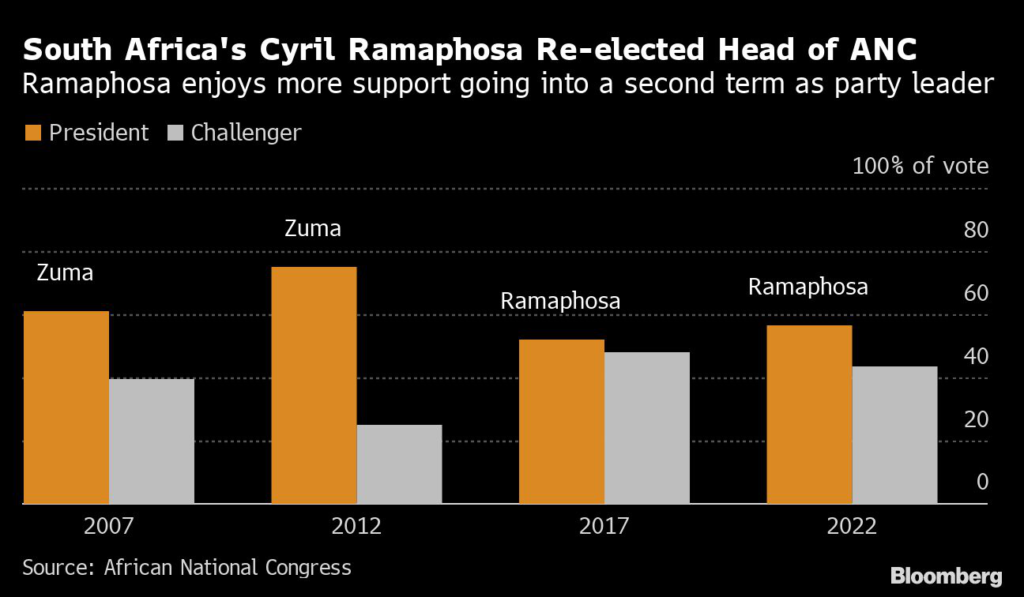Cyril Ramaphosa comfortably won re-election as head of South Africa’s governing party just weeks after a scandal threatened to derail his political career, and now faces an uphill battle to rebuild its flagging support heading into a national vote in 2024.
(Bloomberg) — Cyril Ramaphosa comfortably won re-election as head of South Africa’s governing party just weeks after a scandal threatened to derail his political career, and now faces an uphill battle to rebuild its flagging support heading into a national vote in 2024.
Rampahosa allies also won most of the African National Congress’s other six top party positions, giving him a firmer hold over the party. The outcome should reassure investors that his administration will continue with reforms to revive the stuttering economy. The rand gained as much as 2.8% against the dollar.
Ramaphosa, 70, garnered 2,476 votes to secure a second five-year term at the party’s helm, and former Health Minister Zweli Mkhize 1,897. He considered quitting as the nation’s president earlier this month after an independent panel denounced his handling of the theft of foreign currency that was stuffed in a sofa at his game farm, but later backtracked and denied wrongdoing.
The results were announced by Kgalema Motlanthe, the ANC’s head of elections, at a party conference on the outskirts of Johannesburg on Monday. Paul Mashatile, previously the ANC’s treasurer-general, easily won the deputy leader post. He beat Justice Minister Ronald Lamola and Eastern Cape Premier Oscar Mabuyane, who were both preferred by the president’s camp.
But Ramaphosa allies Gwede Mantashe and Fikile Mbalula were respectively chosen as ANC chairman and secretary-general. The other three top positions all went to women, with Gwen Ramokgopa elected treasurer-general, and Nomvula Mokonyane and Maropene Ramokgopa as the two deputy secretary-generals.
“Five out of seven candidates voted in the top seven positions belong to President Ramaphosa’s camp, which will help him strengthen his grip on the party,” Cristian Maggio, the head of portfolio and ESG Strategy at TD Securities in London, said in a note to clients. “The market is likely to reward the fading of political uncertainty for now with a strong rand and lower yields, though none of South Africa’s structural issues will be immediately resolved by this vote.”
Support for the 110-year-old ANC, which has ruled South Africa since the end of apartheid in 1994, dropped below 50% for the first time in a local government vote last year, and several opinion polls show it’s in danger of losing its national majority in 2024. Confidence in the party has been eroded by its failure to head off an energy crisis and stem an economic decline that’s spawned rampant unemployment, inequality and crime.
Ramaphosa is one of the country’s most seasoned politicians. A former labor union leader who made a fortune after going into business, he helped to negotiate a peaceful end to White-minority rule in the early 1990s and led a panel that drafted the country’s first democratic constitution.
He succeeded Jacob Zuma as the nation’s president in early 2018 and pledged to tackle the economic malaise and endemic corruption that set in during his predecessor’s nine-year rule.
Since then, he has sought to end the monopoly of Eskom Holdings SOC Ltd., the debt-stricken state power utility that’s subjected South Africans to intermittent blackouts from 2008, freeing companies to build their own generating plants and supply the grid. The spectrum needed to modernize the nation’s telecommunications industry was sold after more than a decade of delays.
Read more: Why Blackouts Are Still Crippling South Africa: QuickTake
Ramaphosa has also made progress rebuilding the nation’s law-enforcement capabilities that were systematically hollowed out under Zuma. Several former leaders of state companies, politicians and party officials have been charged with corruption.
He’s been less successful in firing up an economy that’s been battered by the coronavirus pandemic and the energy crisis, and business leaders and foreign investors have called for the acceleration of reforms needed to help reduce a 32.9% unemployment rate.
“This is a positive outcome for South Africa, certainly a positive outcome for the governing party,” his spokesman Vincent Magwenya told reporters. But more importantly, it “is a positive outcome for the acceleration of the institutional reforms that the president has undertaken as well as the economic reforms that will take us to the envisaged next level of economic performance,” he said.
Read more: Analysts, Officials React to Ramaphosa Second Term as ANC Leader
–With assistance from Paul Vecchiatto, Paul Richardson, Rene Vollgraaff, Prinesha Naidoo, Gem Atkinson and Colleen Goko.
(Updates with results of vote for other key posts in fourth paragraph.)
More stories like this are available on bloomberg.com
©2022 Bloomberg L.P.











